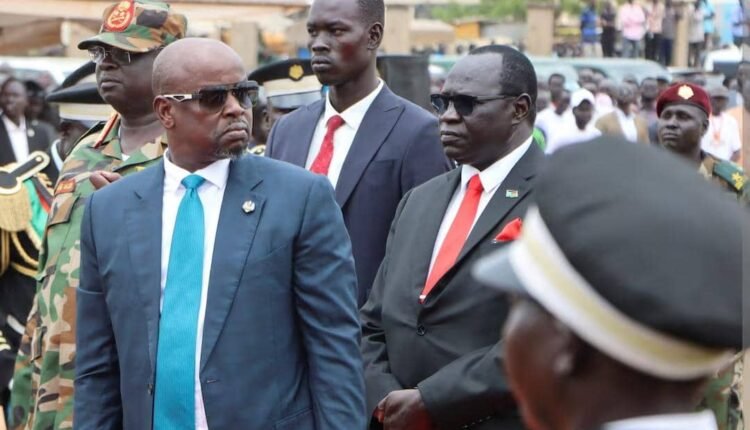UN Report Exposes “organised looting” by South Sudan’s Rulers While Citizens go Hungry

Sudanhorizon – Agencies
United Nations investigators on Tuesday accused the authorities in South Sudan of looting the country’s wealth, including paying $1.7 billion to companies linked to Vice-President Benjamin Bol Mel for road construction projects that were never carried out.
The UN Commission on Human Rights in South Sudan, in its report, said these payments made between 2021 and 2024 were just one example of the “grand corruption” in the impoverished nation, where average GDP per capita has fallen to a quarter of its level at independence in 2011.
The Commission, established by the UN Human Rights Council in 2016, said: “The country has been captured by a kleptocratic elite that has institutionalised the systemic looting of the nation’s wealth for personal gain.”
The report, cited by Reuters, noted that the annual allocation to the President’s Medical Unit exceeds total health spending nationwide.
In an official written response to the UN Commission, Justice Minister Joseph Geng said the report was based on figures that did not match government data, attributing the country’s economic problems to conflict, climate change and declining crude oil sales, its main source of revenue.
A spokesman for Bol Mel declined to comment.
Conflict since cessation
Since 2011, South Sudan has suffered repeated bouts of armed conflict, including a civil war between 2013 and 2018 in which an estimated 400,000 people were killed.
Last week, the government accused First Vice-President Riek Machar – whose forces fought against troops loyal to President Salva Kiir during the civil war – of committing crimes against humanity, escalating tensions that have fuelled recent fighting.
South Sudan is also facing sharp cuts in the external humanitarian aid it receives each year.
But the report argued that corruption is the clearest explanation for its ongoing economic and humanitarian crises, with nearly two-thirds of its 12 million people facing severe hunger or worse.
The Commission said the report was based on 173 meetings and targeted interviews conducted between late 2022 and late 2024, as well as government documents and financial data.
It said its focus on corruption was justified because it had undermined the government’s ability to meet its human rights obligations and had directly contributed to fuelling armed violence.
“In a zero-sum struggle for power and control over resources and land, South Sudan’s elites continue to pursue factional political objectives, exploiting ethnic divisions and tensions,” the Commission added.
“Oil-for-roads” programme off the books
The 101-page report highlighted companies linked to Bol Mel, who was promoted by President Salva Kiir to one of his five vice-presidential posts in February.
The US government had sanctioned Bol Mel and two of his companies in 2017, saying one of them received preferential treatment from senior officials to carry out roadworks in the country.
In 2021, two more of his companies were sanctioned.
After the 2017 sanctions, the South Sudanese government denied Washington’s description of him as Kiir’s personal financial adviser, saying the decision to block him was based on misinformation.
Joseph Zlavic, a lobbyist working for Juba in Washington, told Reuters last month that South Sudanese officials had urged the administration of President Donald Trump to lift those sanctions during recent bilateral discussions.
He said the talks also included the issue of returning more deportees from the United States to South Sudan, following the arrival of eight men in July, seven of them from third countries.
The US State Department declined to comment on the private diplomatic contacts but urged Juba to “start using public revenues to meet the needs of the people of South Sudan instead of relying on international aid.”
According to the UN report, the South Sudanese government paid around $2.2 billion between 2021 and 2024 to companies linked to Bol Mel through an off-budget “oil-for-roads” programme.
In some years, this programme accounted for about 60% of all government spending, the report said.
Despite these outlays, Bol Mel–linked companies delivered drivable roads worth less than $500 million, with contracts inflated through exaggerated road lengths, overpricing compared to market standards, and the construction of fewer lanes than agreed, according to the report.
The report did not specify the nature of Bol Mel’s links to the companies, but two of the three named firms were among those sanctioned by the United States in 2021.
Bol Mel has not publicly responded to the allegations.
In his response, Justice Minister Geng denied the road-spending claims, saying the figures cited in the report were unrealistically high given South Sudan’s economic reality.
He pointed to anti-corruption laws enacted before independence and again in July 2024 as proof of the government’s “serious commitment and political will to combat corruption.”
Public spending fails to meet people’s needs
More broadly, the report said public spending priorities do not reflect the government’s obligations towards its citizens.
It said little of the more than $23 billion raised from oil exports since independence has been directed towards urgent needs such as education, healthcare and food security.
For example, in the 2022–2023 national budget, more funds were allocated to the President’s Medical Unit than to the entire country’s community, public, secondary and university healthcare systems combined.
The government did not specifically address this point but said it was working to enhance the well-being of its citizens. The Minister for Presidential Affairs did not respond to a request for comment.
Shortlink: https://sudanhorizon.com/?p=7662

